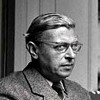“ our wishes can affect the future but not the past, the future is to some extent subject to our power, while the past is unalterably fixed. But every future will some day be past: if we see the past truly now, it must, when it was still future, have been just what we now see it to be, and what is now future must be just what we shall see it to be when it has become past. ”
Bertrand Russell, Mysticism and Logic and Other Essays (1910). copy citation
| Author | Bertrand Russell |
|---|---|
| Source | Mysticism and Logic and Other Essays |
| Topic | past future |
| Date | 1910 |
| Language | English |
| Reference | |
| Note | |
| Weblink | http://www.gutenberg.org/files/25447/25447-h/25447-h.htm |
Context
“That this is the case may be seen at once by asking ourselves why our feelings towards the past are so different from our feelings towards the future. The reason for this difference is wholly practical: our wishes can affect the future but not the past, the future is to some extent subject to our power, while the past is unalterably fixed. But every future will some day be past: if we see the past truly now, it must, when it was still future, have been just what we now see it to be, and what is now future must be just what we shall see it to be when it has become past. The felt difference of quality between past and future, therefore, is not an intrinsic difference, but only a difference in relation to us: to impartial contemplation, it ceases to exist. And impartiality of contemplation is, in the intellectual sphere, that very same virtue of disinterestedness which, in the sphere of action, appears as justice and unselfishness.”
source



